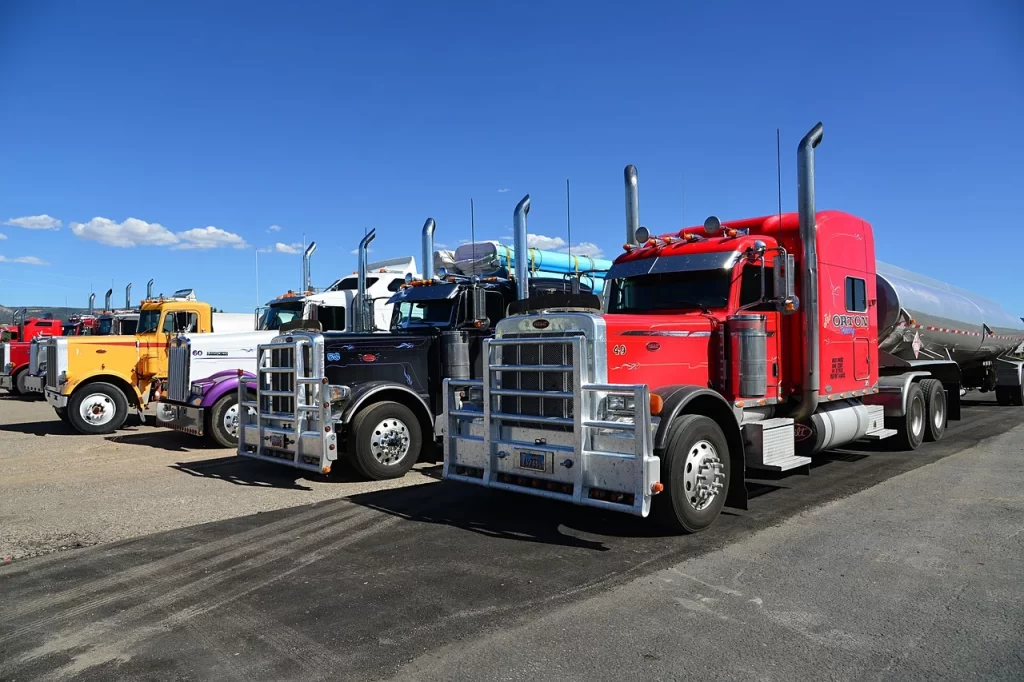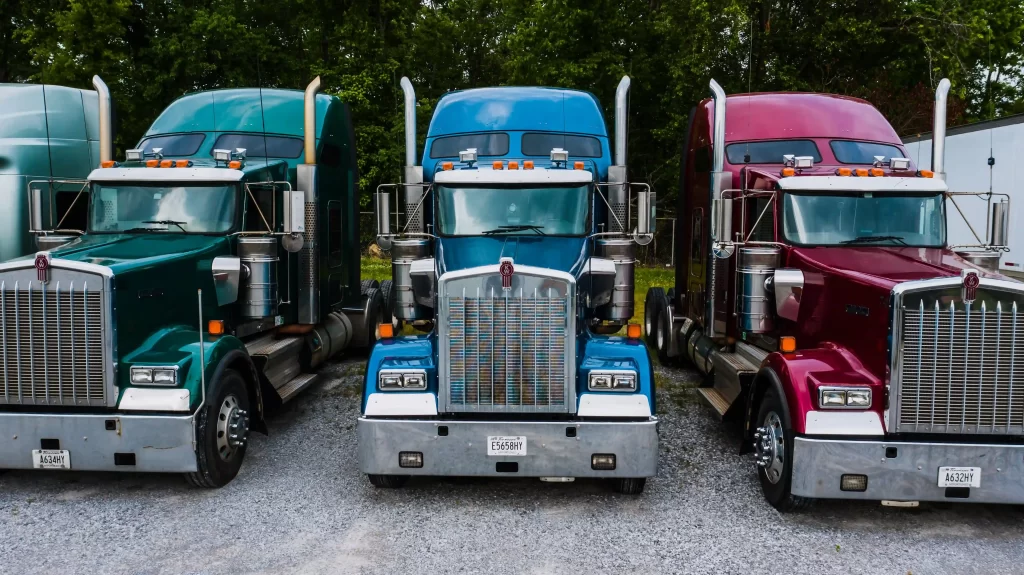
The trucking industry needs more places for truck drivers to park their rigs and rest during long hauls. With a shortage of truck parking spaces nationwide, drivers often end up in unsafe areas when they can’t find an open spot. This demonstrates the profitable business opportunity of starting a truck parking lot to meet an essential demand.
Truck parking provides a dedicated place for truckers to park legally and meet federally mandated rest requirements. Lots can be basic paved spaces or full truck stops with amenities. At minimum, they allow drivers to get off the road when tired or out of driving hours.
In this article, we cover the key steps to launching a successful truck parking business. From scouting locations to establishing facilities, policies, and pricing to marketing your services, you’ll have a roadmap to provide essential parking capacity and serve truck drivers in your community. We’ll also look at how Truck Parking Club connects drivers with alternative parking options.
By helping truckers keep on trucking safely, you also stand to make some handsome profits – a win-win situation!
The Truck Parking Crisis
With limited space and swelling numbers of trucks on the highways, parking has become painfully scarce. This crisis is draining driver health, hurting businesses, and risking safety.
According to the American Transportation Research Institute, nearly two-thirds of drivers struggle to find adequate parking every day. Over 90% say the shortage decreases their quality of life on the road. Without spots to pull over, many end up parked unsafely on highway shoulders and ramps. This provokes accidents, injuries, and fines.
The Federal Highway Administration estimates a shortage of over 40,000 parking spaces nationwide. With freight demand projected to continue to grow, the lack of rest stops and truck lots will only worsen.
It’s clear additional parking capacity will provide immense benefits. But major public projects take time. This is why private businesses have an opportunity to fill the gap faster by converting available land into potential truck parking facilities.
Why Start a Truck Parking Lot Business?
In business, you’ve got to seize the right opportunity at the right time. And there’s no better time than when demand is high and supply is critically low. That’s exactly the case when it comes to truck parking today.
As outlined already, the trucking industry is facing a severe shortage of safe, accessible truck parking lots. This imbalance of high demand and constrained supply creates the perfect opening to step into this highly favorable supply-demand gap.
Reliable Income Stream
Now that we’ve established this as a likely profitable venture, what other benefits come with this business, you ask? For starters, you can count on a steady stream of income. By providing in-demand parking spaces and charging daily or monthly fees, the cash keeps rolling in reliably each month. It’s not a quick flash-in-the-pan revenue source but a steady, recurring income you can take to the bank.
Low-Maintenance Business
There’s also minimal stress and effort involved to keep the operation humming. This isn’t rocket science – it’s parking! While it takes some effort to get up and running, once built, day-to-day operations are pretty straightforward.
You’ll need a small staff for maintenance, fee collection, and security. But the business itself mostly runs on auto-pilot if you’ve got a good system in place. It doesn’t require complex oversight, and you’ll avoid the hassles and stress of more complicated businesses.
How Truck Parking Club Can Help
Truck Parking Club is an innovative new platform launched in 2022 that connects truck drivers with private property owners willing to rent out parking spaces. This allows for better utilization of existing spaces at businesses with extra room.
- Drivers can search for available parking spots across the country all in one place. Real-time listings show immediate parking availability.
- Advance reservations can be made from days ahead to the last minute. This gives drivers flexibility and peace of mind, knowing they have a guaranteed spot.
- Property owners can generate income by renting underutilized land or excess parking capacity to truckers. The site vets and registers participating locations.
- Owners set their own competitive rates and manage individual bookings and transactions. Reviews help build reputations.
- The service targets a wide range of property types – trucking companies, industrial sites, storage facilities, vacant land, etc. Thousands of new spaces can be added this way.
Already Have a Trucking Parking Spot – List It With Us!
Research the Market
The first step in starting your truck parking lot business is to thoroughly research the local market. This will help you determine if there is sufficient demand in your area to support a profitable parking lot operation.
- You’ll want to begin by assessing if there is indeed a shortage of truck parking spaces in your city or region. Look at any data on parking availability, complaints from truckers, and rates of illegal truck parking to gauge the unmet need. Driving major freight transportation routes yourself can also reveal any obvious lack of truck parking lots.
- Evaluate traffic patterns to estimate the number of trucks passing through daily that could utilize your lot. Proximity to highways, distribution centers, and other freight hubs is ideal.
- Research existing competitors in the vicinity. Make notes on their location, number of spaces, amenities, condition, and pricing. This can help you identify shortcomings or untapped opportunities in the local market.
- Interviewing local truckers directly can offer invaluable insight into parking pain points and what they look for in a parking facility.
Develop a Business Plan
After researching the viability of your local market, the next step is to put together a comprehensive business plan. This will outline all the key details and financial projections for your proposed truck parking operation.
- Start by clearly describing your parking lot concept and layout. You’ll need to factor in the number of spaces and on-site amenities as well as requirements like fencing, lighting, and paving.
- Determine your location criteria based on proximity to major freight routes and hubs. Assess any zoning regulations and permitting requirements for potential sites.
- Outline your target customers and parking lot policies. Will you cater to long-haul truckers, local deliveries, or a mix? What are your payment terms, and how will you promote occupancy?
- Project your operating expenses, including land purchase or lease, construction, staffing, maintenance, insurance, taxes, and other ongoing costs. Then, estimate your income from parking fees and other potential revenue streams.
- Develop financial projections showing expected startup costs, ROI timeframes, and ongoing profit and loss.
- Also, factor in financing options and a timeline to get up and running. Determine if you need small business loans or investors to fund the launch and initial operating costs.
Find a Location
You’ll want to secure a site that’s both affordable and ideally positioned to attract truckers passing through.
- Look for inexpensive, undeveloped land along major highways and freight routes. Check zoning laws to ensure parking lots are permitted uses for properties you’re considering.
- Being near freight hubs like industrial parks, distribution centers, and intermodal facilities provides a natural customer base. Proximity to food, fuel, and other trucker amenities is also ideal.
- The site should allow for easy highway access and exit without requiring tricky maneuvers for big rigs. Make sure there is enough acreage to accommodate your planned parking capacity and on-site facilities.
- Evaluate noise ordinances, environmental impact rules, and community relations. You may encounter some not-in-my-backyard (NIMBY) resistance that needs addressing.
- Look into any state or local economic development incentives available for new transportation-related businesses.
- Survey the site drainage and terrain. Factoring in paving, grading, and lighting costs early allows for more accurate budgeting.
- Secure any required permits and licenses for development and operation based on local regulations. These may include zoning variances, building permits, or special use allowances.
- Leverage legal and real estate professionals to review title claims, boundary surveys, purchase agreements, and property leases to protect your interests.
Set Up Facilities & Operations
Once you’ve secured the right truck parking lot location, it’s time to set up the physical facilities and standard operating procedures.
- Start by grading the land and paving the parking surfaces. Asphalt or concrete provide durable options able to withstand heavy truck traffic. Proper drainage is key to avoid pooling water.
- Install sturdy fencing around the perimeter along with security cameras, lighting, and alarm systems. This keeps the lot and parked trucks safe.
- Construct any buildings needed for site offices, restrooms, showers, etc. Obtain proper permits and comply with codes.
- Designate parking spaces with painted lines and numbering. This allows for assigning and tracking specific spots. Consider angles and sizes that optimize capacity.
- Post clear signage regarding policies, fees, entry & exit points, speed limits, and other usage guidelines. Signs should be visible from the road to direct truckers in.
- Hire staff for security, maintenance, cleaning, and fee collection.
- Implement a parking management system to assign spaces, track occupancy, and process payments.
- Prominently display contact information so drivers can get assistance and provide feedback.
- Regularly evaluate operations to identify any potential safety risks or areas for improvement. Stay responsive to user feedback.
Legal and Compliance
It is vitally important that you get all your legal and compliance boxes ticked before opening up your parking lot.
- Choose a business structure that offers the right level of liability protection. Common options include sole proprietorship, partnership, corporation, or LLC. Consult professionals to determine the best fit.
- Register your business name and establish federal and state tax IDs. You may need special licenses and permits to operate a parking facility in your area.
- Look into zoning laws, land use regulations, environmental impact studies, and transportation codes that could apply to your parking lot.
- Make sure to obtain necessary permits and licenses for development, construction, and operation. Common ones may include building permits, special use allowances, stormwater management plans, signage approvals, etc.
- Have lawyers review any business contracts, loan agreements, lease documents, and liability insurance policies. This protects your interests. Consult lawyers experienced in transportation industry laws and regulations.
- Implement accounting systems to handle taxes, document income/expenses, manage payroll, and track other financials. Stay compliant with regular filings and payments.
- Maintain adequate insurance policies covering general liability, property damage, worker’s compensation, employer’s liability, and commercial auto. Review annually.
Market Your Truck Parking Services
It’s now time to get the word out about your new truck parking facility and attract drivers.
- Create a website highlighting your location, parking availability, amenities, and fees. This is often the first place truckers will look for parking options.
- Run ads in trucking publications.
- Place prominent roadside signage and billboards along highways leading to your lot. These catch the eye of passing truckers.
- Partner with nearby businesses like distribution centers, truck washes, restaurants, and motels to advertise or offer referral discounts.
- Leverage social media by creating business pages on Facebook, X (formerly Twitter), etc.
- Offer promotions like discounted weekly/monthly rates when starting out to build your customer base.
- Make sure your lot can be easily found on Google Maps and GPS systems that truckers rely on to navigate.
- Encourage customer reviews on platforms like Yelp to build credibility. Respond promptly to any concerns.
- Provide referral rewards to existing customers who recommend your lot to other drivers. Strong word-of-mouth is powerful.
- Stay in contact with regular customers to ensure satisfaction.
- Leverage platforms like Truck Parking Club to extend your reach.
Expanding Your Business
Once your first truck parking lot is up and running smoothly, you’ll have all the knowledge needed to build an empire of trucking parking lots by replicating the process we’ve outlined.
Maybe you are happy enough with just one truck parking lot, but you can still diversify your offerings if you want more profits. Adding complementary services like a truck wash, repair shop, or food court brings in added revenue streams.
Wrapping Up
We’ve covered all the steps needed to start a truck parking lot business – it’s now up to you to put the advice into drive.
Remember, at Truck Parking Club, we’re always here to support your parking lot venture. Once you’re up and running, join our platform to extend your reach. List your new facility to tap into our vast trucker network, seeking safe parking options.
The information published herein is for general informational purposes only. Truck Parking Club does not make any representations or warranties about the completeness, reliability, legality, and accuracy of this information. Any reliance placed on such material is strictly at the user’s own risk. Truck Parking Club shall not be responsible for any losses or damages incurred in connection with the information published herein.





